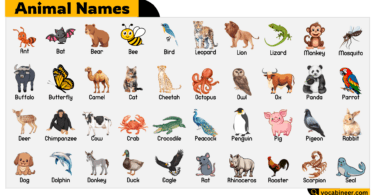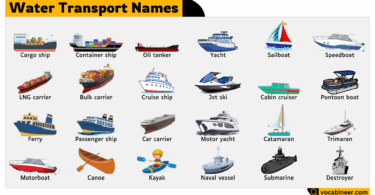Weather vocabulary includes words that describe air conditions like temperature, rain, wind, and snow. This post helps you learn weather vocabulary words with pictures in English, making it easier to understand common weather terms. Related phrases include climate words, meteorological terms, weather conditions, and forecast language. Designed for students and English learners, this resource improves language skills and helps explain weather clearly with visual support.
In This Page
List of 100 Weather Words in English with Pictures
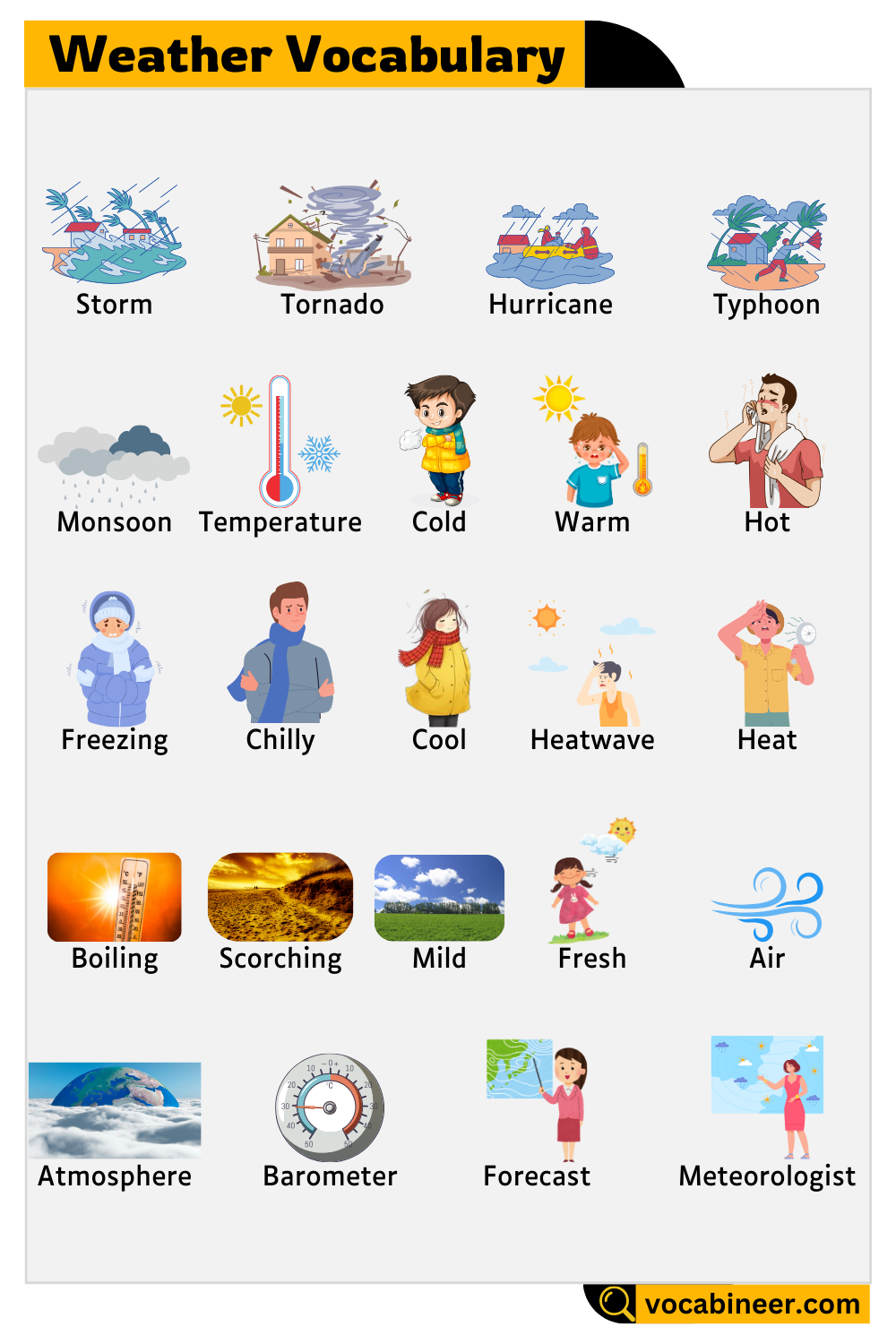
Below is a list of 100 weather words often used in English, paired with visuals for easier recognition:
- Sunny — The sun is shining brightly
- Cloudy — The sky is full of clouds
- Rainy — It is raining
- Stormy — There is thunder, lightning, or strong winds
- Snowy — Snow is falling
- Windy — The wind is blowing hard
- Foggy — The air is thick with fog
- Hazy — There is low visibility due to dust or smoke
- Overcast — The sky is completely covered with clouds
- Drizzle — Light rain
- Shower — A brief period of rain
- Downpour — Heavy rain
- Thunderstorm — A storm with thunder and lightning
- Lightning — A flash of light in the sky during a storm
- Thunder — The sound made by lightning
- Sleet — Rain mixed with snow
- Hail — Small balls of ice falling from the sky
- Blustery — Very windy
- Gale — A very strong wind
- Breeze — A light wind
- Freezing — Below 0°C or 32°F
- Boiling — Extremely hot
- Chilly — A little cold
- Icy — Covered with ice
- Lukewarm — Neither hot nor cold
- Mild — Soft or gentle temperature
- Frosty — Covered with frost
- Humid — Wet and warm
- Dry — No moisture in the air
- Misty — Light fog
- Smoky — Air filled with smoke
- Dusty — Full of fine dry particles
- Clear — No clouds in the sky
- Calm — No wind or movement
- Cool — Slightly cold
- Warm — Comfortably hot
- Hot — High temperature
- Cold — Low temperature
- Thundercloud — A cloud producing thunder
- Snowflake — A single piece of snow
- Snowstorm — A storm with heavy snow
- Ice storm — A storm with freezing rain
- Heatwave — A period of very hot weather
- Cold front — A weather front with cold air
- Warm front — A weather front with warm air
- Jet stream — High-speed air currents
- Barometer — A tool to measure air pressure
- Thermometer — A tool to measure temperature
- Anemometer — A tool to measure wind speed
- Rain gauge — A tool to measure rainfall
- UV index — A scale for sun exposure
- Dew point — The temperature where dew forms
- Precipitation — Any form of water falling from the sky
- Condensation — Water droplets forming on a surface
- Evaporation — Liquid turning into vapor
- Meteorologist — A weather scientist
- Forecast — A prediction of the weather
- Weather map — A visual forecast
- Satellite — A device in space monitoring weather
- Radar — Tool detecting precipitation
- Temperature — Measurement of heat or cold
- Wind chill — How cold it feels due to wind
- Heat index — How hot it feels with humidity
- Visibility — How far one can see
- Barometric pressure — Air pressure
- Atmosphere — Layer of gases around Earth
- Climate — Long-term weather pattern
- Weather — Day-to-day conditions
- Drought — Long period without rain
- Flood — Excess water covering land
- Monsoon — Seasonal heavy rain
- Tornado — Spinning funnel of wind
- Hurricane — A large storm with high winds
- Cyclone — A system of winds rotating inward
- Typhoon — A hurricane in Asia
- Lightning bolt — A single flash of lightning
- Thunderclap — A loud sound of thunder
- Ice cap — A mass of ice covering land
- Snowdrift — Snow piled by wind
- Glacier — A large moving ice mass
- Black ice — Thin invisible ice on roads
- Slush — Partially melted snow
- Storm surge — Rise in sea level from a storm
- Whiteout — Snow makes everything look white
- Flurries — Light snowfall
- Raincloud — A cloud that brings rain
- Sunbeam — A ray of sunlight
- Rainbow — Colors in the sky after rain
- Twister — Another name for tornado
- Nor’easter — A strong storm along the east coast
- Weather balloon — A balloon used to measure weather
- Cloudburst — Sudden heavy rain
- Thermals — Rising warm air
- Updraft — Rising air in a storm
- Downdraft — Falling air in a storm
- Microclimate — Climate of a small area
- Windstorm — Strong wind without rain
- Heat dome — A high pressure trap of heat
Common Weather Words in English for Kids Learning
Here are simple and common weather terms that kids often hear or use:
- Sunny – When the sun is shining bright in the sky.
- Rainy – When water falls from the clouds as rain.
- Cloudy – When the sky is covered with clouds.
- Windy – When the air moves fast and you can feel the wind.
- Snowy – When white snowflakes fall from the sky.
- Stormy – When there is strong wind, rain, thunder, and lightning.
- Hot – When the temperature is very warm.
- Cold – When the temperature is very low or chilly.
- Foggy – When there is thick mist or fog that makes it hard to see.
- Humid – When the air feels wet and sticky.
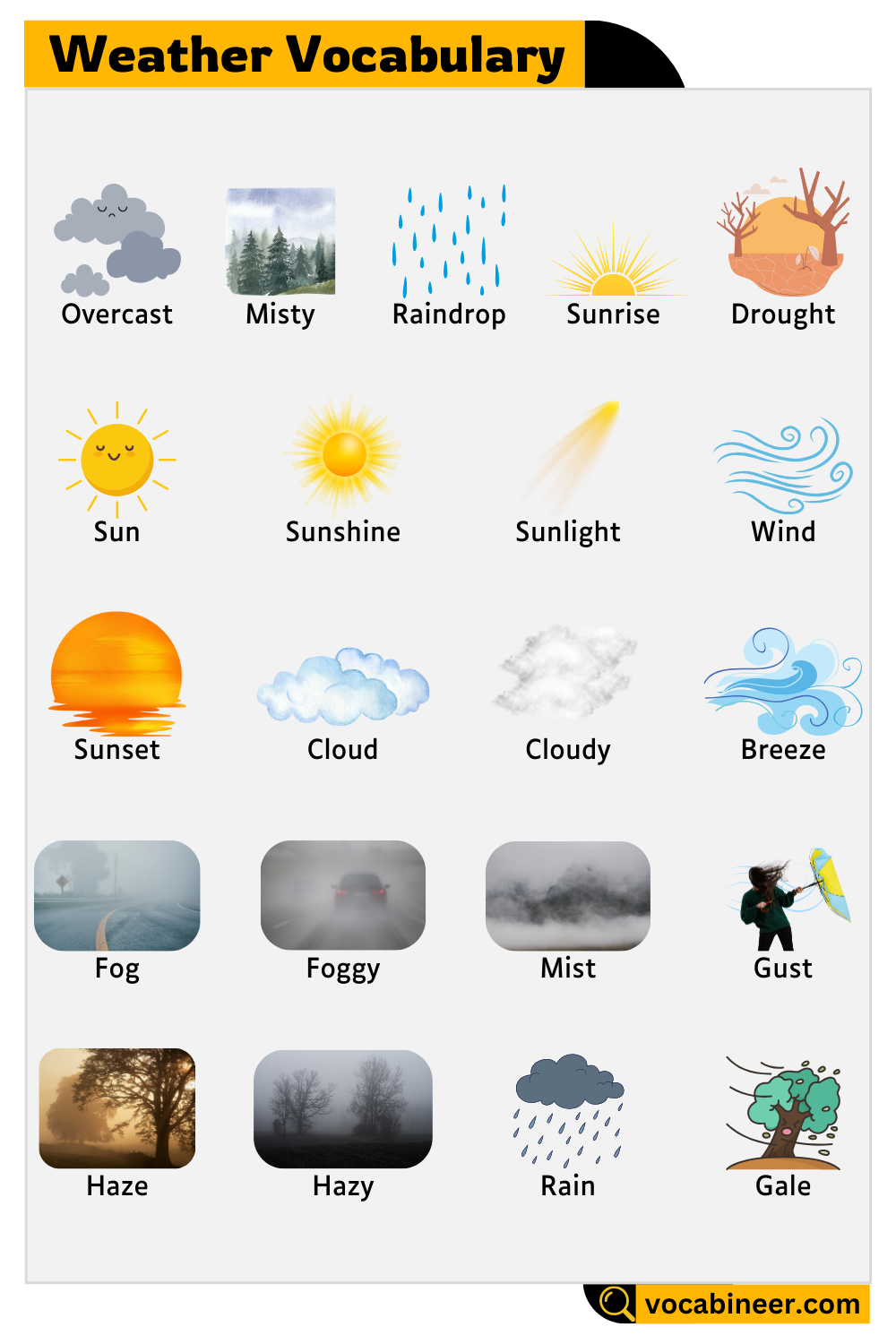
Describing Weather in English with Examples
Use these words and phrases to describe what the weather is like:
- It is sunny today.
- The weather is cloudy.
- It looks stormy.
- It is raining heavily.
- There’s a breeze in the air.
- The sky is overcast.
- It’s a cold winter morning.
- It is hot and humid today.
- The night is clear and calm.
- The weather is freezing.
Weather Conditions Vocabulary in English
Below is a chart of common weather conditions:
- Sunny — Bright and clear
- Cloudy — Covered with clouds
- Rainy — Falling rain
- Snowy — Falling snow
- Windy — Blowing wind
- Foggy — Low visibility
- Stormy — Strong winds and lightning
- Overcast — Sky fully covered with clouds
- Clear — No clouds in the sky
- Humid — High moisture in the air
Temperature Vocabulary Words in English with Pictures
This list includes vocabulary related to how hot or cold it is:
- Hot — High temperature
- Warm — Comfortable temperature
- Cool — Slightly cold
- Cold — Low temperature
- Freezing — Below 0°C or 32°F
- Boiling — Extremely hot
- Chilly — A bit cold
- Icy — Very cold and slippery
- Lukewarm — Not hot or cold
- Mild — Soft or gentle temperature
Rain and Storm Vocabulary Words in English
These words relate to rainy and stormy weather:
- Drizzle — Light rain
- Shower — Short rain
- Downpour — Heavy rain
- Thunderstorm — Rain with thunder and lightning
- Thunder — Loud sound from sky
- Lightning — Flash of light
- Hail — Ice balls falling
- Flood — Too much rain water
- Sleet — Rain and snow mixed
- Storm — Heavy wind and rain
- Cyclone — Storm with strong winds
- Hurricane — Very large storm
- Tornado — Fast-spinning wind funnel
Wind and Sky Vocabulary Words in English
These terms describe the wind and sky appearance:
- Windy — Wind blowing strongly
- Breeze — Light and gentle wind
- Gale — Very strong wind
- Blustery — Strong and noisy wind
- Calm — No wind
- Clear — No clouds
- Overcast — Fully cloudy
- Cloudy — Some clouds
- Foggy — Thick air with low visibility
- Hazy — Dust or smoke in the air
- Misty — Light fog
- Smoky — Air filled with smoke
Seasonal Weather Vocabulary with Images
Each season brings unique weather. Here are words linked to seasons:
Spring:
- Blooming — Flowers growing
- Rainy — Many showers
- Breezy — Light winds
Summer:
- Sunny — Bright days
- Hot — High temperatures
- Humid — Moist air
Fall/Autumn:
- Cool — Lower temperatures
- Windy — Blowing leaves
- Chilly — Cold mornings
Winter:
- Snowy — Falling snow
- Freezing — Very cold
- Frosty — Ice on surfaces
Weather Forecast Vocabulary in English
These words are often used in weather reports:
- Forecast — Weather prediction
- High temperature — Warmest point
- Low temperature — Coldest point
- Humidity — Moisture level
- Chance of rain — Possibility of rain
- Sunrise — Time sun comes up
- Sunset — Time sun goes down
- Wind speed — How fast the wind blows
- Visibility — How far you can see
- Pressure — Atmospheric force
- UV index — Sun strength level
- Dew point — Temperature where dew forms
Weather-Related Idioms and Phrases in English
Idioms are fun and common in conversation. Here are weather-related ones:
- Under the weather — Feeling sick
- Come rain or shine — No matter what happens
- It’s raining cats and dogs — Raining heavily
- On cloud nine — Very happy
- Storm in a teacup — Small problem made big
- Snowed under — Too busy
- Break the ice — Start a conversation
Simple Weather Vocabulary Chart with Pictures
| Weather Word | Meaning | Example Sentence |
|---|---|---|
| Sunny | Bright with sunshine | It is sunny today. |
| Cloudy | Covered with clouds | The sky is cloudy. |
| Rainy | With falling rain | It is rainy; take an umbrella. |
| Windy | Strong wind blowing | It’s very windy outside. |
| Snowy | Falling snow | It’s snowy in winter. |
| Stormy | With thunder and rain | We stayed inside during the storm. |
| Foggy | Full of fog | The road is foggy this morning. |
| Hot | High temperature | It is hot in summer. |
| Cold | Low temperature | It gets cold in December. |
| Humid | Wet and warm air | It’s hot and humid today. |
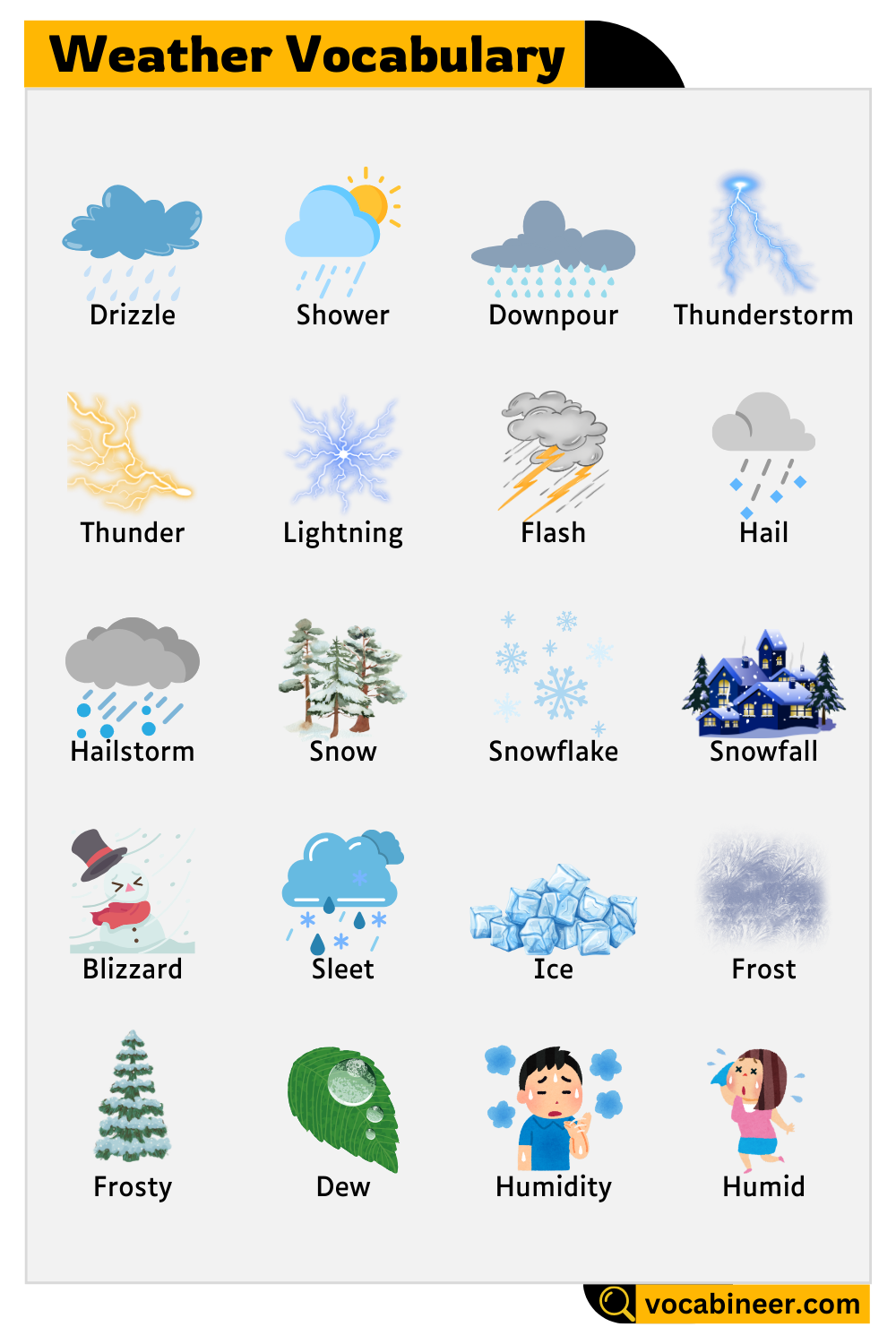
FAQs About Weather Vocabulary Words in English
Words like sun, rain, snow, wind, cloud, hot, cold, storm, and fog are common in weather discussions. These terms describe most daily conditions.
Group them into categories like sun, rain, snow, wind, and use pictures for better memory. Practice with flashcards and daily usage.
Fog is thicker and reduces visibility more than mist. Mist is lighter and often appears in the morning. Both form from water droplets.
They are the same type of storm. A hurricane happens in the Atlantic, while a typhoon happens in the Pacific. Both have strong winds and rain.
A meteorologist studies the weather and gives the forecast using tools like a barometer. They share information through news and websites.
Read More



